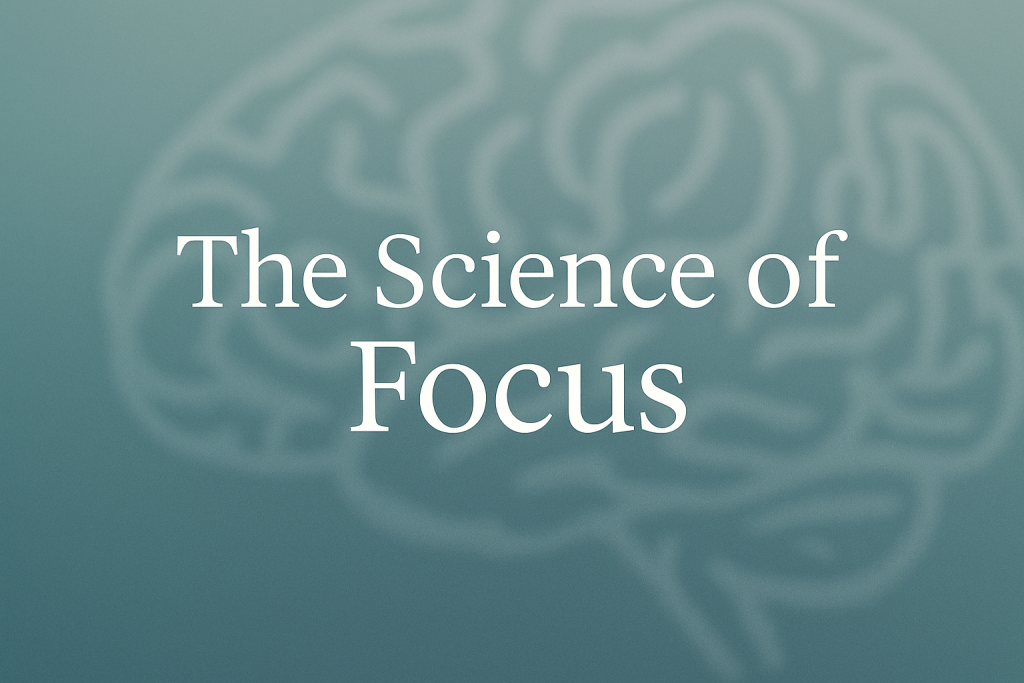The Science of Focus: How Your Brain Gets Interrupted
Understand how distractions hijack your attention — and how to take it back
Why Can’t I Stay Focused Anymore?
You sit down with the best intentions — to write, read, or complete a task — and before you know it, you’ve checked your phone, switched tabs, and lost 30 minutes to digital wandering. Sound familiar?
In today’s world, attention is under siege. From notifications to mental overload, our brains are constantly being pulled away from what matters. But what’s really happening inside your mind when you lose focus — and how can you regain control?
In this article, we’ll explore the science of focus: how your brain gets interrupted, what causes mental drift, and practical ways to protect your cognitive bandwidth.
—
How the Brain Focuses — and Gets Distracted
The Prefrontal Cortex: Your Attention Command Center
The prefrontal cortex (PFC) is the part of your brain responsible for focus, planning, and self-control. It acts like a spotlight, directing mental energy toward a specific task. But this spotlight is fragile — and easily knocked off course.
The Cost of Switching Tasks
Every time you switch from one task to another (even mentally), your brain has to reorient itself — a process called “attention residue.” According to neuroscience research, it can take up to 23 minutes to fully return to your original task after an interruption.
Dopamine and the Distraction Loop
Notifications, new emails, and social media all trigger a dopamine release — the brain’s reward chemical. This creates a feedback loop that trains your mind to seek novelty, even when deep focus is more valuable.
—
Why Your Brain Craves Distraction
It’s Wired for Survival, Not Productivity
From an evolutionary standpoint, your brain is always scanning for threats or opportunities — a mechanism that once kept you safe in the wild. But today, that same system is hijacked by clickbait, pings, and multitasking.
Too Much Input = Cognitive Overload
When your brain is bombarded with information, it becomes harder to filter what matters. This leads to decision fatigue, shallow thinking, and decreased willpower to resist distractions.
Stress Makes Focus Harder
Under stress, the brain activates the amygdala — your emotional response center — which overrides the prefrontal cortex. This makes it harder to focus, think logically, or resist distractions when you’re anxious or overwhelmed.
—
How to Protect and Train Your Focus
1. Create Distraction-Free Zones
Turn off notifications, close unused tabs, and set boundaries with your phone. Use tools like Focus Mode, website blockers, or noise-canceling headphones to create a controlled mental environment.
2. Use the Pomodoro Technique
This method uses intervals of 25 minutes of focused work followed by 5-minute breaks. It helps reset your attention and prevents mental fatigue while maintaining sustained effort.
3. Strengthen the Focus Muscle with Meditation
Regular mindfulness meditation improves the brain’s ability to sustain attention. Even 10 minutes a day can enhance gray matter in areas responsible for focus and emotional regulation.
4. Single-Task with Clear Intent
Multitasking drains your brain. Instead, set a clear intention: “For the next 20 minutes, I’m doing only this.” Label distractions when they arise, then gently return to your task — no judgment.
—
Conclusion: Focus Is a Skill — Not a Trait
In an age of constant interruption, protecting your focus is one of the most valuable things you can do. By understanding how your brain gets distracted and training it to return to attention, you reclaim control over your time, creativity, and peace of mind.
Focus isn’t about force — it’s about choosing where your mind lives moment to moment.
✨ Want to sharpen your attention? Subscribe for weekly focus tools, neuroscience insights, and simple mental fitness practices to help you thrive in a distracted world.
